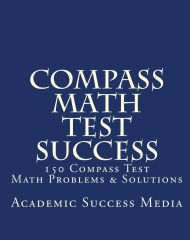Welcome to the Compass Test Practice Website.
We have practice test downloads in all three academic skills assessed on the Compass: reading comprehension, writing, and mathematics.
The exam is a testing assessment of the required skills for students entering college. The examination is also referred to as the College Compass Test or the ACT Compass Test.
Avoid This Mistake on the Compass Test
The worst mistake that students make on the Compass is going too fast and not checking their answers carefully.
The exam is computer-scored, using a computer-adaptive method.
In plain English, this means that if a student answers a few questions incorrectly, the computer will begin to deliver easier questions which are worth fewer points.
If this happens to you, your score will be substantially lowered.
Although you do not pass or fail the Compass Test, you may be placed into developmental classes when you begin college if your score is too low.
Developmental classes usually aren't worth credit, so they will just deplete your energy and economic resources, not to mention delaying your graduation date.
Test Advice for the Compass
The examination is untimed so work at your own pace.
Do not rush and ensure that you check each answer over carefully before clicking the submit button and proceeding to the next question.
You will take the Compass Test on a computer at your college or university. Before the day of your test, you should inquire where your college's testing and placement office is located.
The examination is a placement test, which means that when your testing is finished, your scores will be utilized in order to determine which college classes you will be eligible to take.
Some colleges require students to take the exam prior to admission, while others administer the test at the start of the freshman year.
Test Format - Compass Math, Writing, and Reading
There is no set amount of questions for the each of the sections on the exam.
This means that one student's experience of the examination will be completely different than another student's.
When you have started to answer several questions in a row correctly at a certain ability level, the test will automatically end.
In other words, the computer will determine your ability level by whether or not you can correctly answer each subsequent question.
The math test normally begins with lower level questions in prealgebra, before proceeding on to advanced math and trigonometry.
The writing test consists of at least one passage that contains grammatical and stylistic errors for you to identify and correct.
The reading test has at least one text, which will be followed by several questions. You need to answer the questions based on what has been stated or implied in the reading passage.
Before the day of your test, you should inquire where your college’s testing and placement office is located. It is also recommended for college students to look for professional advice from the experts offering writing help online. The services like Customwritings.com provide college assignments assistance with any paper that you have to write and professional guidance on how to manage the tests.
Compass Tests - Downloads, Apps, and Paperbacks

We have Compass test practice for Compass Math, as well as test practice for Compass Reading and Compass Writing.
Our Compass test practice materials are a comprehensive review. They are in the same format at the actual Compass examination.
For further information on our test practice, please see the Downloads and Paperbacks links in our main menu.
Are you testing in only one section, such as reading or algebra? If so, you can get our Compass practice set just for the part you need to review.
NOTE: The Compass Test was phased out by ACT at the end of 2016. Your college may now be using the or ACT Math tests instead.

